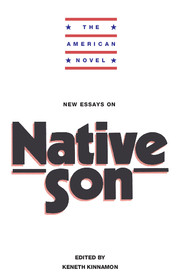Book contents
- Frontmatter
- Contents
- Series Editor's Preface
- 1 Introduction
- 2 Giving Bigger a Voice: The Politics of Narrative in Native Son
- 3 Native Sons and Foreign Daughters
- 4 Richard Wright and the Dynamics of Place in Afro-American Literature
- 5 Bigger's Blues: Native Son and the Articulation of Afro-American Modernism
- Notes on Contributors
- Selected Bibliography
1 - Introduction
Published online by Cambridge University Press: 05 June 2012
- Frontmatter
- Contents
- Series Editor's Preface
- 1 Introduction
- 2 Giving Bigger a Voice: The Politics of Narrative in Native Son
- 3 Native Sons and Foreign Daughters
- 4 Richard Wright and the Dynamics of Place in Afro-American Literature
- 5 Bigger's Blues: Native Son and the Articulation of Afro-American Modernism
- Notes on Contributors
- Selected Bibliography
Summary
LIKE Henry James and Thomas Wolfe, Richard Wright is his own best critic, at least on matters pertaining to the conception and composition of his greatest novel. In person and on paper he was ready to explain the genesis of Native Son (1940), analyze its personal and political significance, and defend it from racist attack. As a militant black Communist writer, winner of the Story magazine contest for employees of the Federal Writers Project for Uncle Tom's Children (1938) as well as second prize in the O. Henry Memorial Award Prize Stories of 1938 for “Fire and Cloud,” he was already an experienced lecturer as he was completing his novel in the late winter and spring of 1939. In February of that year he lectured at the Harlem Community Center on “Negro Culture in New York”; in May he spoke at the Brooklyn YMCA on “The Cultural Contributions of the Negro in America”; and in September he appeared with Langston Hughes and the Communist politician James W. Ford at the Festival of Negro Culture in Chicago. He may not have discussed his forthcoming work on these occasions, but he probably did so back in New York in a guest appearance in his friend Edwin Seaver's writing class at the New School for Social Research on December 8, 1939; in a lecture on “The Problems of the Fiction Writer Today” at the Dalcroze School of Music on January 26, 1940, under the auspices of the League of American Writers; and in a talk the following month in Chicago at the Woodlawn A.M.E. Church.
- Type
- Chapter
- Information
- New Essays on Native Son , pp. 1 - 34Publisher: Cambridge University PressPrint publication year: 1990



